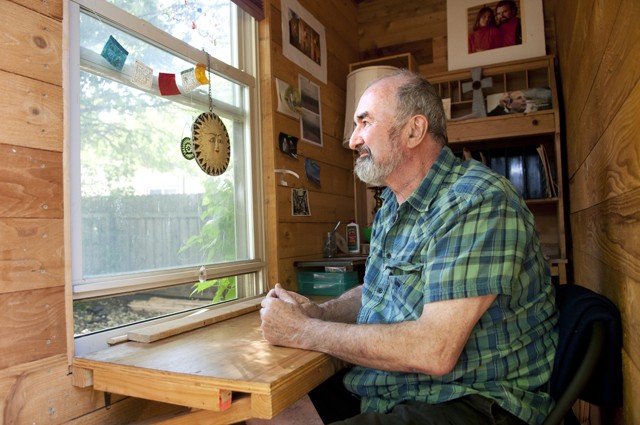Poet and former University of Minnesota creative writing professor Michael Dennis Browne recently retired after 45 years of teaching. Nearly 70, Browne is still full of wit, timeless advice and vivacity.
Retirement is treating him well.
âÄúI donâÄôt miss the regular commitment. I wasnâÄôt quite up to it anymore,âÄù Browne said.
He is working on new projects and has continued writing and giving readings.
âÄúI write all the time, pretty much every day,âÄù he said.
The English department can already sense his absence.
âÄúHe was pretty much the lifeblood of the poetry program here,âÄù Michael T. Walsh, executive secretary of the Department of English, said. âÄúI do think the department is going to change a lot âĦ ThereâÄôs a change in that he is already missed.âÄù
Poetry has been a vital part of BrowneâÄôs life since he was a teenager.
âÄúI wrote a bad poem, I had a crush on the girl next door. But the real catalyst was when I was 19 and my wonderful father died âĦ and I found that only poetry really helped.âÄù
Browne has exposed himself to a plethora of literature.
âÄúI was raised on traditional poetry and I love it âĦ but when I began to read American poetry in the âÄô60s I got terribly excited and thought I had to go to America and experience the new poetry,âÄù he said.
These days, Browne is reading mostly books on theology and psychology, but poetry will never leave him.
âÄúItâÄôs like breathing. ItâÄôs what you do,âÄù he said.
In addition to being a poet, Browne is also a librettist and a lyricist. There is an obvious connection between music and poetry that naturally flows.
âÄúThey are both transformative. ItâÄôs like dancing âÄî it takes walking and transforms it. I think in music and in poetry there is a transformative element,âÄù he said. âÄúIt takes something supposedly ordinary and it becomes rhythmical, becomes magical, has healing properties.âÄù
His powerful sense of music is found within his poetry and teaching style as well.
âÄúAs a teacher and as a poet his strongest assets were his ear for rhyme and meter, which he could pick out at the snap of a finger,âÄù Walsh said.
Even though he is finished teaching at the University, Browne is still able to give his sage advice to young writers and students. People may think that writing poetry is difficult, but Browne has âÄú24 hours worth of radar.âÄù For him, poetry flows through him.
âÄúItâÄôs like dreaming. But I think it is important to do it regularly, to make yourself available to your dreaming self,âÄù he said.
Browne was able to inspire his poetry students and was a wellspring of advice, suggesting students find their poetic niche.
âÄúLearn one new poem a week by living poets and just fall in love with a poem a week and in a year you will have 52 poems that become a part of you,âÄù he said.
âÄúOr go to a poetry reading âÄî a good one, by a good writer, because theyâÄôre not always great âÄî and when you hear a poem spoken out loud in real time it really knocks your socks off. Then you realize that poetry is magic, you can get a crush on poetry,âÄù he added.
You donâÄôt have to be a poet to love poetry, and you donâÄôt have to be a poet to understand the brilliance of Browne. Even in retirement he continues to inspire.
âÄúYou have to persist. You have to keep going even if you donâÄôt have success or even if you make a fool of yourself,âÄù Browne advised. âÄúDonâÄôt let the world take it away from you by being indifferent to you or making fun of you. ItâÄôs a kind of secret passion you have. You have to hang in there even when things donâÄôt go too well.âÄù
Browne will always be a teacher âÄî even if he is no longer at the University. He teaches those around him to appreciate what surrounds them. And then they tend to write poems about it.








